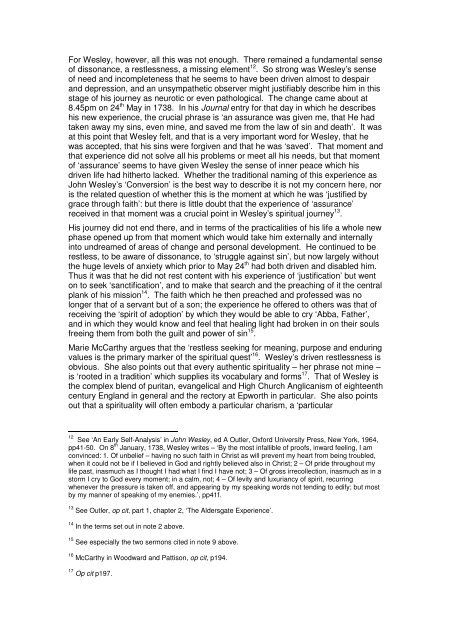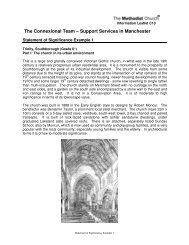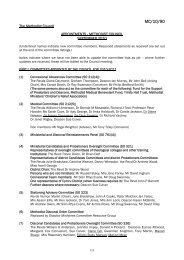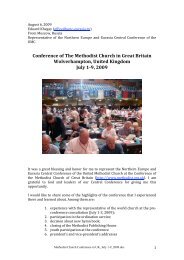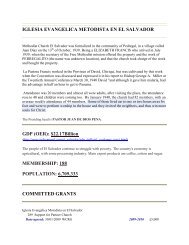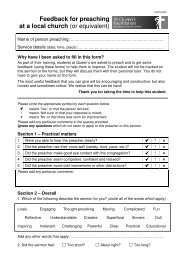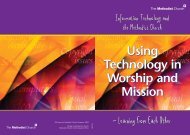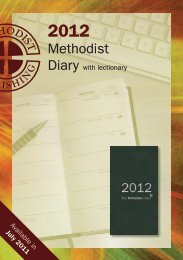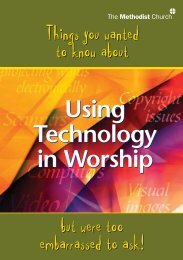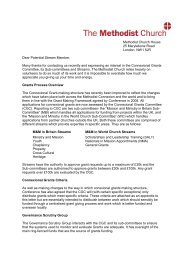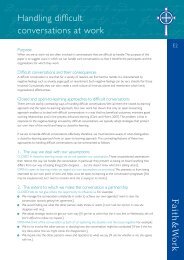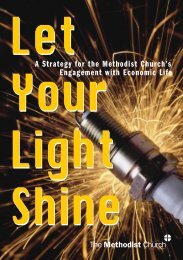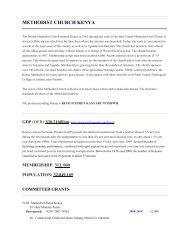Scriptural Holiness - The Methodist Church of Great Britain
Scriptural Holiness - The Methodist Church of Great Britain
Scriptural Holiness - The Methodist Church of Great Britain
- No tags were found...
You also want an ePaper? Increase the reach of your titles
YUMPU automatically turns print PDFs into web optimized ePapers that Google loves.
For Wesley, however, all this was not enough. <strong>The</strong>re remained a fundamental sense<strong>of</strong> dissonance, a restlessness, a missing element 12 . So strong was Wesley’s sense<strong>of</strong> need and incompleteness that he seems to have been driven almost to despairand depression, and an unsympathetic observer might justifiably describe him in thisstage <strong>of</strong> his journey as neurotic or even pathological. <strong>The</strong> change came about at8.45pm on 24 th May in 1738. In his Journal entry for that day in which he describeshis new experience, the crucial phrase is ‘an assurance was given me, that He hadtaken away my sins, even mine, and saved me from the law <strong>of</strong> sin and death’. It wasat this point that Wesley felt, and that is a very important word for Wesley, that hewas accepted, that his sins were forgiven and that he was ‘saved’. That moment andthat experience did not solve all his problems or meet all his needs, but that moment<strong>of</strong> ‘assurance’ seems to have given Wesley the sense <strong>of</strong> inner peace which hisdriven life had hitherto lacked. Whether the traditional naming <strong>of</strong> this experience asJohn Wesley’s ‘Conversion’ is the best way to describe it is not my concern here, noris the related question <strong>of</strong> whether this is the moment at which he was ‘justified bygrace through faith’: but there is little doubt that the experience <strong>of</strong> ‘assurance’received in that moment was a crucial point in Wesley’s spiritual journey 13 .His journey did not end there, and in terms <strong>of</strong> the practicalities <strong>of</strong> his life a whole newphase opened up from that moment which would take him externally and internallyinto undreamed <strong>of</strong> areas <strong>of</strong> change and personal development. He continued to berestless, to be aware <strong>of</strong> dissonance, to ‘struggle against sin’, but now largely withoutthe huge levels <strong>of</strong> anxiety which prior to May 24 th had both driven and disabled him.Thus it was that he did not rest content with his experience <strong>of</strong> ‘justification’ but wenton to seek ‘sanctification’, and to make that search and the preaching <strong>of</strong> it the centralplank <strong>of</strong> his mission 14 . <strong>The</strong> faith which he then preached and pr<strong>of</strong>essed was nolonger that <strong>of</strong> a servant but <strong>of</strong> a son; the experience he <strong>of</strong>fered to others was that <strong>of</strong>receiving the ‘spirit <strong>of</strong> adoption’ by which they would be able to cry ‘Abba, Father’,and in which they would know and feel that healing light had broken in on their soulsfreeing them from both the guilt and power <strong>of</strong> sin 15 .Marie McCarthy argues that the ‘restless seeking for meaning, purpose and enduringvalues is the primary marker <strong>of</strong> the spiritual quest’ 16 . Wesley’s driven restlessness isobvious. She also points out that every authentic spirituality – her phrase not mine –is ‘rooted in a tradition’ which supplies its vocabulary and forms 17 . That <strong>of</strong> Wesley isthe complex blend <strong>of</strong> puritan, evangelical and High <strong>Church</strong> Anglicanism <strong>of</strong> eighteenthcentury England in general and the rectory at Epworth in particular. She also pointsout that a spirituality will <strong>of</strong>ten embody a particular charism, a ‘particular12 See ‘An Early Self-Analysis’ in John Wesley, ed A Outler, Oxford University Press, New York, 1964,pp41-50. On 8 th January, 1738, Wesley writes – ‘By the most infallible <strong>of</strong> pro<strong>of</strong>s, inward feeling, I amconvinced: 1. Of unbelief – having no such faith in Christ as will prevent my heart from being troubled,when it could not be if I believed in God and rightly believed also in Christ; 2 – Of pride throughout mylife past, inasmuch as I thought I had what I find I have not; 3 – Of gross irrecollection, inasmuch as in astorm I cry to God every moment; in a calm, not; 4 – Of levity and luxuriancy <strong>of</strong> spirit, recurringwhenever the pressure is taken <strong>of</strong>f, and appearing by my speaking words not tending to edify; but mostby my manner <strong>of</strong> speaking <strong>of</strong> my enemies.’, pp41f.13 See Outler, op cit, part 1, chapter 2, ‘<strong>The</strong> Aldersgate Experience’.14 In the terms set out in note 2 above.15 See especially the two sermons cited in note 9 above.16 McCarthy in Woodward and Pattison, op cit, p194.17 Op cit p197.


